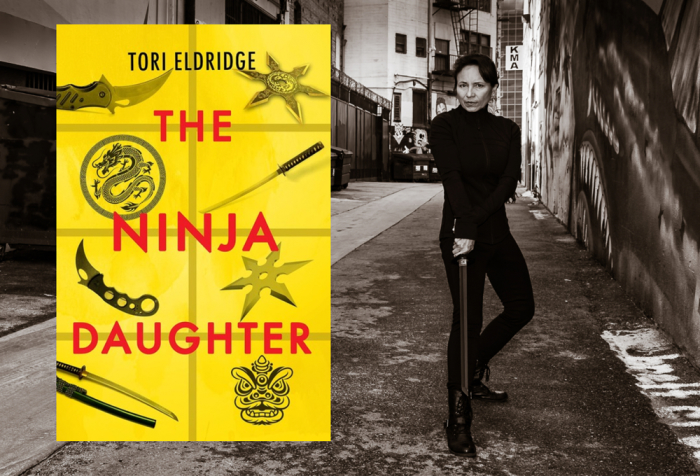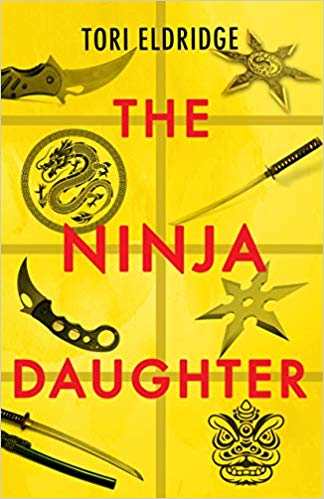An Interview with Tori Eldridge, Author of The Ninja Daughter

Shifts in the weather have long ushered in the rise of particular book genres. Literary newsletters offer romance-littered lists of “poolside reads” and autumn takes a turn for the mysterious, while the box office fills spring with meet-cutes and summer with slashers. In this present lull between back-to-school shopping and holiday gift guides comes Tori Eldridge’s The Ninja Daughter, whose knife-wielding, bike-riding, mystery-solving ninja heroine will delight readers all year round.

A pinch private eye, a dash vigilante, and a heaping helping of dumplings form but the tip of the iceberg that is Lily Wong, a young woman determined to use her unique skill set to help abused women in Los Angeles escape to safety and freedom. When a routine assignment lands her in the middle of a coverup, she finds herself in the crosshairs of an assassin whose abilities rival her own, and he will stop at nothing to cut off every loose end.
Eager to unravel more of the mysteries surrounding The Ninja Daughter, we reached out to Tori with a few questions. We hope you enjoy her answers and insight.
Your main character, Lily Wong, and yourself share a passion for various forms of martial arts. What drew you to begin studying martial arts, and what would you say has been the greatest benefit of the practice for you?
As a child in Hawaii, I used to watch kung fu movies at my calabash auntie’s theater in Chinatown. Once I retired from professional dance and enrolled my son in karate, I regained my interest. During the first class, my teacher noted my aptitude and accelerated my training. That moment birthed my obsession with the martial arts. Tang Soo Do quickly led to kickboxing and to To-Shin Do ninjutsu, the modern evolution of the ninja martial arts that changed the course of my life.
My ninja experience has given me peace of mind, a gentler heart, and the kind of grit that comes from challenging fears, testing athleticism, facing disillusionment, and combat training with trusted partners.
A modern-day hero deserves a modern-day noble steed, and Lily’s comes in the form of her trusty road bike. Is cycling another passion you share with your protagonist?
I haven’t owned a bike since my sons were little and my husband and I took them on weekend bide rides at the beach. But Lily Wong—despite the similarities in our heritage and martial arts training—is a very different person than me. She’s a twenty-five-year-old warrior sleuth, honed for battle and driven by a mission, with some adamant opinions about fitness and L.A. traffic. As far as she’s concerned, Angelenos spend too much of their time sitting in car seats when, with a little discipline and planning, they could improve their physical and mental health by riding a bike and using mass transit. To this end, Lily favors a lightweight Merida racing bike she can cart onto a Metro train or bus with ease.
Throughout the novel, Lily often finds herself at war with her conflicting natures—her “casual” style and attitude clashing against her desire to meet her mother’s expectations, or her attraction to both Daniel and Tran exemplifying a larger decision about which side of herself she wishes to embrace. In crafting such a complex, relatable character, did you pull any of Lily’s internal jigsaw puzzle from your own life experiences?
You’ve hit at the heart of Lily—and me—with this question. She and I both struggle for balance between conflicting extremes. We’re difficult to categorize. We don’t stay in our lane. And we baffle people with our seemingly incongruent behavior. The moment someone thinks they have us figured, we show them another side they never knew existed. And although this description feels very personal to Lily and me, I think many readers would also describe themselves in this way. People are complex and deeply layered, regardless of what others perceive. Lily’s introspective challenges throughout The Ninja Daughter are both personal (to her) and universal. She’s a fascinating character who will resonate with readers of all ages and genders.
Food plays a large role in your novel, with Lily’s father running a restaurant and her mind never wandering too far from her stomach, and the link between food and memory is something we can all relate to. Like Lily and her dumplings, what is a meal you have a special connection to?
I wrote some of my favorite comfort foods into this book, including my near-obsession with tea. Strike that: I’m completely obsessed with tea. I also love to eat. My favorite Asian foods include zongzi sticky rice dumplings, char siu bao (although I toss most of the bun), roast duck with extra crispy skin, congee, inari sushi (known as cone sushi in Hawaii), lau lau (fatty pork wrapped in taro leaf), and two-day-old poi. All of these foods remind me of my childhood in Honolulu and connect me to my Chinese-Hawaiian heritage.
Not all books are good candidates for book club discussions, with many thrillers falling into that category. What sets The Ninja Daughter apart from other thrillers, and what about the novel makes it ideal for book clubs?
The Ninja Daughter delves deeply into family relationships, grief, morality, mixed-race culture, diversity, women’s empowerment, and crimes against women in ways that are usually tackled through literary, historical, or women’s fiction. These topics broaden perspective and inspire meaningful conversation. That I’ve managed to explore them while still keeping the pace of an action-packed mystery/thriller may have been what inspired J. T. Ellison (New York Times bestselling author of Tear Me Apart), to say I was “redefining the genre.”
Finally, what can you tell us about what might be next for Lily Wong?
Every action has repercussions and every act of violence takes its toll. In book two of the Lily Wong series, our warrior protector faces personal demons as she fights to rescue teenagers, tackles the sex trafficking underworld, and copes with a visit from Gung-Gung and Po-Po for Ma’s 50th birthday. And of course…there’s Daniel.
Danielle Ballantyne
